International Trade and Logistics \ 1-1

Logistics not only provides speed and flexibility to businesses, but also creates significant cost advantages. This work, which aims to contribute to the need for Turkish resources, which is felt to be lacking in our country, which can not get enough share from this sector despite its geographical and historical advantages, examines the subjects of storage, material handling and packaging by pointing to one of the most known operation areas of logistics. The book is a useful handbook for young people who are growing up in the field of logistics and for all managers and employees currently operating in the logistics sector.
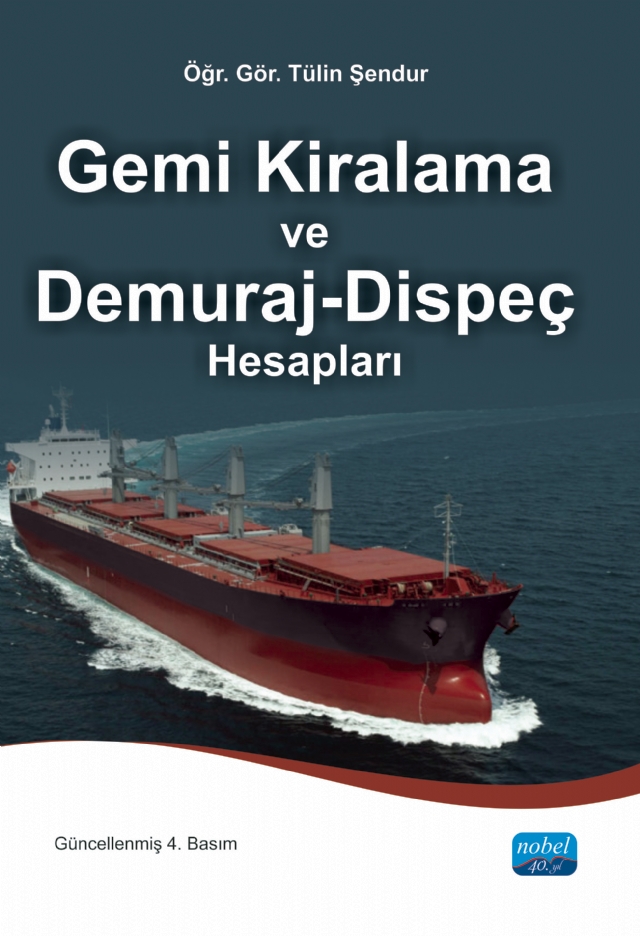
World trade is an indispensable element for the needs, quality of life and welfare of humanity, and the indispensable part of world trade is transportation systems, which are the most important part of the logistics sector. Maritime transport is the only option as the cheapest freight transport in transportation systems, in intercontinental distances, in large volumes. Today, 90% of world trade is carried out by sea.
In the first part of the book, general features of maritime transport, maritime transport in the world and in Turkey, fleet analysis, maritime transport types, cargo and ship types, freight market, international maritime organizations, in the second part, ship chartering and commercial operation, charter agreements and freight In the third part, a research and solution proposals for the determination of the ship management problems in dry cargo transportation in Turkey, in the fourth part; In order to ensure trouble-free ship management, a case study analysis of the connection and operation stages of a dry cargo ship is included, and in the fifth section, sample applications on demurrage-dispatch calculations are given.
Due to the fact that ship management is an international and specific business, English professional abbreviations and jargon are used as the language of correspondence, even if the parties are Turkish companies during the chartering process and ship operation, which is called ship connection. Subjects such as ship management and brokerage, which have been taught in universities in London since the beginning of the 1900s, have only been partly taught in the logistics departments of our universities in recent years. Considering that it can be a good resource as a desktop vocational guide book for both university students and employees who have just stepped into the sector, English professional abbreviations and jargon are used in the correspondence between the parties in the case study analysis, and the English abbreviation of the abbreviations and their Turkish translation are included in parentheses.
In the first part of the book, general features of maritime transport, maritime transport in the world and in Turkey, fleet analysis, maritime transport types, cargo and ship types, freight market, international maritime organizations, in the second part, ship chartering and commercial operation, charter agreements and freight In the third part, a research and solution proposals for the determination of the ship management problems in dry cargo transportation in Turkey, in the fourth part; In order to ensure trouble-free ship management, a case study analysis of the connection and operation stages of a dry cargo ship is included, and in the fifth section, sample applications on demurrage-dispatch calculations are given.
Due to the fact that ship management is an international and specific business, English professional abbreviations and jargon are used as the language of correspondence, even if the parties are Turkish companies during the chartering process and ship operation, which is called ship connection. Subjects such as ship management and brokerage, which have been taught in universities in London since the beginning of the 1900s, have only been partly taught in the logistics departments of our universities in recent years. Considering that it can be a good resource as a desktop vocational guide book for both university students and employees who have just stepped into the sector, English professional abbreviations and jargon are used in the correspondence between the parties in the case study analysis, and the English abbreviation of the abbreviations and their Turkish translation are included in parentheses.
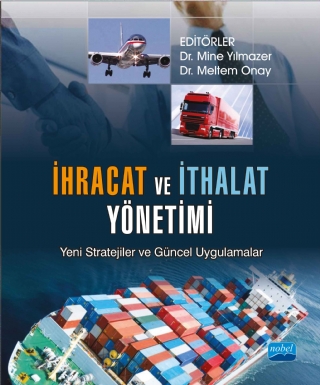
“This valuable publication, which analyzes Turkey's foreign trade structure from a modern point of view, with a wide range of information from the historical evolution of foreign trade and current legislation applications to foreign trade processes, this valuable publication is devoted to those working in this field at all levels, academics and those operating in the private sector/ It is a guide for the professionals who will show it.
Unlike many publications in the field of foreign trade, the book includes interviews where representatives from various sectors of the business world share their experiences. I believe that these interviews, where success stories are told, will make a great contribution to those who have just taken or will take a new step into the business world.
This publication, created in the triangle of public-private sector-university, has been a very valuable study that provides answers from A to Z to questions in the field of foreign trade. I congratulate everyone involved and wish them continued success.”
Adnan Yıldırım (Deputy Minister of Economy)
•••
The point reached in our country, which aims to reach an ambitious export volume of 500 billion dollars from the export-led growth model in the 1980s, is one of the biggest efforts for our development.
Increasing the number of our entrepreneurs who produce and export what they produce and earn foreign currency to the country by using the blessings offered by technology in the most effective way has become more important than yesterday in today's competitive environment.
For this reason, I believe that this publication, prepared by different academics and experts, is a guide in terms of accurate information and using the right resources.
I congratulate everyone who contributed to this valuable publication, with the hope that it will achieve remarkable success in increasing the volume of foreign trade, which is one of our strategic goals.
Ender Yorgancılar (EBSO Chairman of the Board)
•••
The importance of foreign trade is increasing day by day in our globalizing world. I find it very important to share successful examples, transfer past experiences to young entrepreneurs, and thus encourage them.
The work you have created is a very valuable resource in this respect. In particular, interviews with people who have achieved success in Turkish conditions are instructive.
Such publications; It supports production, trade and, in short, life. I congratulate you and everyone involved for your valuable contributions.
Sabri Ünlütürk (Head of Aegean Exporters' Associations Coordinator)
Unlike many publications in the field of foreign trade, the book includes interviews where representatives from various sectors of the business world share their experiences. I believe that these interviews, where success stories are told, will make a great contribution to those who have just taken or will take a new step into the business world.
This publication, created in the triangle of public-private sector-university, has been a very valuable study that provides answers from A to Z to questions in the field of foreign trade. I congratulate everyone involved and wish them continued success.”
Adnan Yıldırım (Deputy Minister of Economy)
•••
The point reached in our country, which aims to reach an ambitious export volume of 500 billion dollars from the export-led growth model in the 1980s, is one of the biggest efforts for our development.
Increasing the number of our entrepreneurs who produce and export what they produce and earn foreign currency to the country by using the blessings offered by technology in the most effective way has become more important than yesterday in today's competitive environment.
For this reason, I believe that this publication, prepared by different academics and experts, is a guide in terms of accurate information and using the right resources.
I congratulate everyone who contributed to this valuable publication, with the hope that it will achieve remarkable success in increasing the volume of foreign trade, which is one of our strategic goals.
Ender Yorgancılar (EBSO Chairman of the Board)
•••
The importance of foreign trade is increasing day by day in our globalizing world. I find it very important to share successful examples, transfer past experiences to young entrepreneurs, and thus encourage them.
The work you have created is a very valuable resource in this respect. In particular, interviews with people who have achieved success in Turkish conditions are instructive.
Such publications; It supports production, trade and, in short, life. I congratulate you and everyone involved for your valuable contributions.
Sabri Ünlütürk (Head of Aegean Exporters' Associations Coordinator)

Mainly, the problem of underdevelopment and development, which was on the economic, social, cultural and even political agenda of all humanity after the Second World War, naturally led to the emergence of a development literature and to its rapid development over time.
This book covers traditional and contemporary theoretical approaches to development economics and policies that can be followed in practice. In this context, the book covers descriptive and measurement issues related to development and underdevelopment; theories of underdevelopment; capital accumulation and technology problems; financing of development; population, human capital and employment problems; development and foreign trade; resource allocation problem; development and industrialization strategies and finally sustainable development issues are discussed. We believe that our book will be useful not only for our students but also for those who want to acquire basic information on the subject.
This book covers traditional and contemporary theoretical approaches to development economics and policies that can be followed in practice. In this context, the book covers descriptive and measurement issues related to development and underdevelopment; theories of underdevelopment; capital accumulation and technology problems; financing of development; population, human capital and employment problems; development and foreign trade; resource allocation problem; development and industrialization strategies and finally sustainable development issues are discussed. We believe that our book will be useful not only for our students but also for those who want to acquire basic information on the subject.
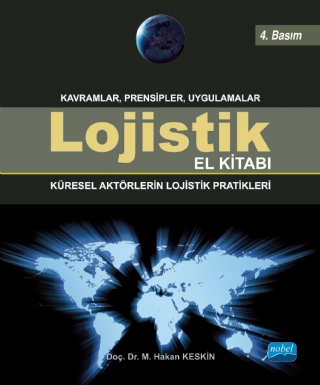
This work, named 'LOGISTICS HANDBOOK', is the fourth edition of the Turkish version of a project that consists of five books [in Turkish and English]. This study in your hand includes 'Deconstruction of Logistics' in which the academic dimension of logistics is handled, 'Background of Logistics' in which the historical dimension of logistics is given, and 'Winning Logistics: ', 'Logistics in Turks and in Turkey', in which the logistics operations of the Turks, who could not find a place in foreign sources despite their extraordinary successes since their existence, are discussed, 'International Logistics', which gives the details of the logistics that is globalizing with increasing momentum and crossing national borders. It consists of five Turkish books.
During the preparation of this edition, since the volume of the third book titled 'Winning Logistics: TZY', which is more comprehensive than the other four, increased too much to be included in this work, the book in question was published as a separate book by NOBEL AKADEMIK PUBLISHING, with the title SUPPLY CHAIN MANAGEMENT. In the study called Handbook, one of the most important components of logistics,
Considering that the supply chain should be mentioned in some way, the information in the mentioned book is summarized in the Third Chapter of this study.
To put it briefly, this study named 'LOGISTICS HANDBOOK' is a part of the project to create a logistics kit, which consists of two books complementing each other with SUPPLY CHAIN MANAGEMENT, a textbook written in Turkish and English for Turkey, and a basic resource. . All books are given a 'Lesson' [14 weeks in accordance with the Bologna process] to be used in logistics programmes.
'Syllabus', 'Learning Objectives', 'Research and Discussion Topics' and 'Assessment Questions' were added for each section. In addition, faculty members are provided with the opportunity to access [PPT] reflections prepared to facilitate their lectures.
During the preparation of this edition, since the volume of the third book titled 'Winning Logistics: TZY', which is more comprehensive than the other four, increased too much to be included in this work, the book in question was published as a separate book by NOBEL AKADEMIK PUBLISHING, with the title SUPPLY CHAIN MANAGEMENT. In the study called Handbook, one of the most important components of logistics,
Considering that the supply chain should be mentioned in some way, the information in the mentioned book is summarized in the Third Chapter of this study.
To put it briefly, this study named 'LOGISTICS HANDBOOK' is a part of the project to create a logistics kit, which consists of two books complementing each other with SUPPLY CHAIN MANAGEMENT, a textbook written in Turkish and English for Turkey, and a basic resource. . All books are given a 'Lesson' [14 weeks in accordance with the Bologna process] to be used in logistics programmes.
'Syllabus', 'Learning Objectives', 'Research and Discussion Topics' and 'Assessment Questions' were added for each section. In addition, faculty members are provided with the opportunity to access [PPT] reflections prepared to facilitate their lectures.
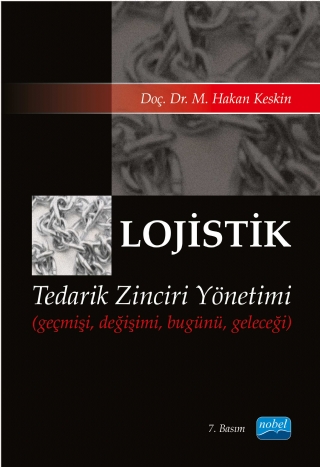
The book in your hand aims to be a handbook that addresses all the arguments related to logistics.
The past, change and current point of the concept of logistics are discussed.
It is enriched with examples selected from important logistics operations in the past and present.
Considering the logistics-related statistics of the determining actors in the globalization process, regional and global evaluations and suggestions regarding the future of logistics were made.
The past, change and current point of the concept of logistics are discussed.
It is enriched with examples selected from important logistics operations in the past and present.
Considering the logistics-related statistics of the determining actors in the globalization process, regional and global evaluations and suggestions regarding the future of logistics were made.
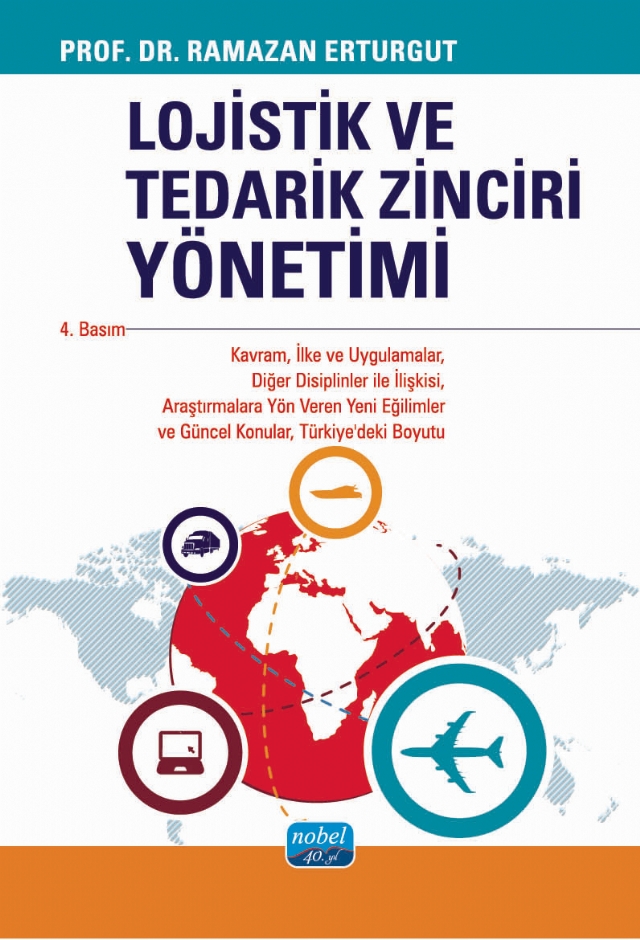
This work aims to reveal a solid knowledge that emerged as a result of the author's 21 years of working experience in the field of logistics, as well as the researches he made during his time abroad. In the book, the concepts, principles and characteristics related to Logistics and Supply Chain Management are presented in a systematic flow. However, there has been an interest in the classification of current issues affecting the progress of Logistics and Supply Chain Management and new trends shaping research. This book also classifies the relations of Logistics and Supply Chain Management as a scientific discipline with other disciplines by supporting the citations from the leading scientific journals in this field, and thus aims to contribute to filling a gap felt in the national literature.
In the content of the book, logistics activities at the scale of enterprises and institutions are presented with a comprehensive content, in addition, logistics management with global norms, logistics strategy, logistics performance management, logistics education, structural problems of logistics and supply chain, and Logistics Management in Turkey are discussed as a separate chapter. taken. In addition, "Annotated Logistics and International Trade Terms Dictionary" and "Incoterms 2010" add-ons, which contain basic terms in both fields, are included for the benefit of those who are interested in the subject. In this respect, it is considered that the work can be a source work for those who train and train in Logistics and Supply Chain Management, as well as scientists and practitioners in the field.
In the content of the book, logistics activities at the scale of enterprises and institutions are presented with a comprehensive content, in addition, logistics management with global norms, logistics strategy, logistics performance management, logistics education, structural problems of logistics and supply chain, and Logistics Management in Turkey are discussed as a separate chapter. taken. In addition, "Annotated Logistics and International Trade Terms Dictionary" and "Incoterms 2010" add-ons, which contain basic terms in both fields, are included for the benefit of those who are interested in the subject. In this respect, it is considered that the work can be a source work for those who train and train in Logistics and Supply Chain Management, as well as scientists and practitioners in the field.
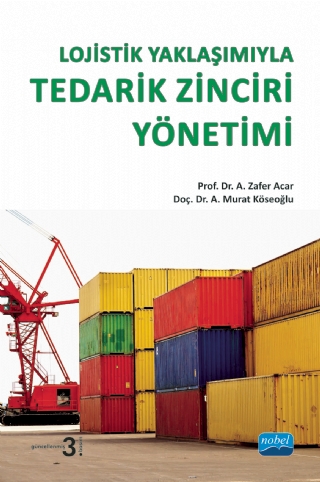
Today, product movements within the supply chain have a vital importance both in terms of businesses and in terms of the trade volume of countries. In addition to this importance, a multidisciplinary perspective is needed in order to comprehend the concept of supply chain and examine it from an academic point of view. This versatility is undoubtedly reflected in the publications in the literature. However, it is seen that it is sometimes confused with the concepts of logistics.
This book, on the other hand, considers logistics as part of the supply chain. In this context, the subjects include the basic functions of both logistics and supply chain management processes from logistics management to supply chain. The plan of the book is based on the Supply Chain Operations Reference Model (SCOR), which has been widely accepted by many authors and academics. Based on the SCOR model, the book is divided into six main sections. The first part includes the concepts of logistics and supply chain management and their relations with each other. The second part, planning; third part, procurement and purchasing; fourth part, manufacturing operations; The fifth part is devoted to distribution issues. The last section is devoted to other important issues on the agenda in the field.
This book, on the other hand, considers logistics as part of the supply chain. In this context, the subjects include the basic functions of both logistics and supply chain management processes from logistics management to supply chain. The plan of the book is based on the Supply Chain Operations Reference Model (SCOR), which has been widely accepted by many authors and academics. Based on the SCOR model, the book is divided into six main sections. The first part includes the concepts of logistics and supply chain management and their relations with each other. The second part, planning; third part, procurement and purchasing; fourth part, manufacturing operations; The fifth part is devoted to distribution issues. The last section is devoted to other important issues on the agenda in the field.
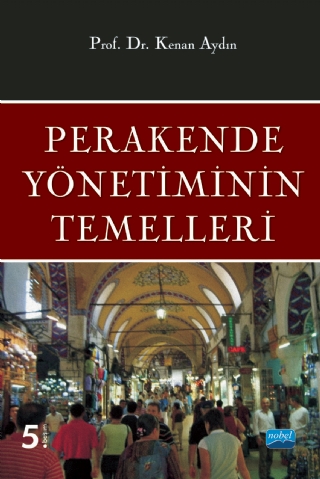
Depending on the socio-economic developments in Turkey, the retail sector has gained a certain momentum especially since the mid-1980s and has come to a position where it can compete with retailing in the USA and EU. It would be appropriate to emphasize some basic facts in the development process of retailing:
• While the development of supermarkets, hypermarkets and shopping malls was at the forefront in Turkey, discount stores have become more popular in recent years; departmental (sectioned) stores either disappeared or changed in size and settled in shopping malls instead of independent stores.
• Local retailers have come to an important position in addition to the entry of foreign capital into the market. Besides organized retail, traditional retailers still have a significant share in the total retail market.
• The share of e-commerce in total retail sales is increasing rapidly in the world and in Turkey. It is estimated that the share of e-commerce in the world in 2020 will be 14.60%.
• Traditional single-channel retailing is not sufficient to meet consumer needs. For this reason, compatible omnichannel retailing has become a necessity.
• With the “One Belt One Road” project announced in 2013, China seeks to develop its global strategy in search of a new order in the new era. This new strategy of China indicates that the economic and political balances will be re-established in the world. The project will connect the easternmost of Asia and the European shores of the Atlantic Ocean, and targets 65 countries, including Turkey, and a population of more than 3 billion. These markets have reached saturation, especially Walmart and Carrefour, and mobilized the main retailers of the USA and the West.
• “Industry 4.0” introduced by Germany in 2015 and “Society 5.0” developed by Japan foresee new approaches. These new approaches will change the way retail does business, as it does in other industries. Retail decision makers will pay more attention to topics such as artificial intelligence and big data analytics in order to understand consumer trends and behaviors.
• While the development of supermarkets, hypermarkets and shopping malls was at the forefront in Turkey, discount stores have become more popular in recent years; departmental (sectioned) stores either disappeared or changed in size and settled in shopping malls instead of independent stores.
• Local retailers have come to an important position in addition to the entry of foreign capital into the market. Besides organized retail, traditional retailers still have a significant share in the total retail market.
• The share of e-commerce in total retail sales is increasing rapidly in the world and in Turkey. It is estimated that the share of e-commerce in the world in 2020 will be 14.60%.
• Traditional single-channel retailing is not sufficient to meet consumer needs. For this reason, compatible omnichannel retailing has become a necessity.
• With the “One Belt One Road” project announced in 2013, China seeks to develop its global strategy in search of a new order in the new era. This new strategy of China indicates that the economic and political balances will be re-established in the world. The project will connect the easternmost of Asia and the European shores of the Atlantic Ocean, and targets 65 countries, including Turkey, and a population of more than 3 billion. These markets have reached saturation, especially Walmart and Carrefour, and mobilized the main retailers of the USA and the West.
• “Industry 4.0” introduced by Germany in 2015 and “Society 5.0” developed by Japan foresee new approaches. These new approaches will change the way retail does business, as it does in other industries. Retail decision makers will pay more attention to topics such as artificial intelligence and big data analytics in order to understand consumer trends and behaviors.
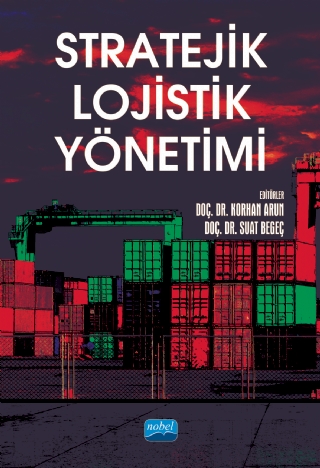
Today, logistics is a multi-stage, fast-changing network structure that covers many businesses and customers, and covers all processes, including infrastructure. Since it is necessary to have a conceptual perspective consisting of the synthesis of all of these for logistics management, it has become a vital priority to manage, maintain and develop appropriate strategies at the strategic level. Therefore, the main objective in strategic logistics management is to provide cost savings, as well as to plan logistics management that will gain a pioneering and innovative feature by predicting the change in technology and ecosystem, and to achieve competitive advantage in which customers are included.
In the Strategic Logistics Management book, which was written in 14 chapters in order to meet the deficiency in the field of strategic logistics management, general information about the development and importance of logistics management, decision-making methods, the relationship between management and logistics, strategic logistics functions, opportunities provided by new information technologies, financial and human factors in the strategic role of logistics. In this context, the role of management in increasing the effectiveness and efficiency are included. In this context, it is aimed to provide readers, professionals and academia with new perspectives on strategic logistics management and to increase their conceptual knowledge by examining these concepts in detail.
In the Strategic Logistics Management book, which was written in 14 chapters in order to meet the deficiency in the field of strategic logistics management, general information about the development and importance of logistics management, decision-making methods, the relationship between management and logistics, strategic logistics functions, opportunities provided by new information technologies, financial and human factors in the strategic role of logistics. In this context, the role of management in increasing the effectiveness and efficiency are included. In this context, it is aimed to provide readers, professionals and academia with new perspectives on strategic logistics management and to increase their conceptual knowledge by examining these concepts in detail.

All the processes that ensure that all the goods and services we need are readily available when we need them, form the core of the Supply Chain. A Supply Chain is a network of relationships that connects customers, retailers and wholesalers, manufacturers and their suppliers, and the regular flow of goods, money and information between individuals and organizations.
customers; they want more suitable, better and lower cost products. Competition between goods and service providers has also reached global dimensions. In order to be successful in competition, it has become a necessity for organizations in the supply chain to establish and execute a coordinated and effective cooperation.
This book; It examines the transactions in the supply chain from raw materials to the end user and the roles of the organizations that perform these transactions, within the framework of various business models. It then focuses on establishing integration between supply chain members on a local and global scale.
customers; they want more suitable, better and lower cost products. Competition between goods and service providers has also reached global dimensions. In order to be successful in competition, it has become a necessity for organizations in the supply chain to establish and execute a coordinated and effective cooperation.
This book; It examines the transactions in the supply chain from raw materials to the end user and the roles of the organizations that perform these transactions, within the framework of various business models. It then focuses on establishing integration between supply chain members on a local and global scale.

The book in your hand is the Turkish version of the project designed as two books in Turkish and English on Supply Chain Management. The aim of the aforementioned project is to provide a textbook and basic resources written specifically for Turkey to the logistics departments, where mostly English or one-to-one translated books are used on "Supply Chain Management".
For this reason, the content of the study was designed to be used in one semester in accordance with 14 weeks. For the convenience of faculty members, a syllabus [syllabus] [according to the Bologna process] has been added at the end of the book, as well as "Learning Objectives", "Discussion and Research Topics" and "Evaluation Questions" for each section.
Based on the foresight that students who graduate from logistics departments will primarily be employed in Turkey, the content of each department has been enriched with field examples and practices suitable for Anatolian realities.
Due to the international nature of supply chains, global supply chain practices and practices of multinational companies that transcend national borders have been added to the examples at the national level.
The reason why the book is prepared in two languages, Turkish and English, is that most of the logistics programs in Turkey provide education in English. Thus, it is thought that Turkish and foreign students [who are considering shaping their future in Turkey] will contribute to the solution of the problems they encounter while taking lessons in a language other than their mother tongue, to overcome the confusion in different languages in logistics jargon, and to have access to both Turkish and English versions of the same subject. .
For this reason, the content of the study was designed to be used in one semester in accordance with 14 weeks. For the convenience of faculty members, a syllabus [syllabus] [according to the Bologna process] has been added at the end of the book, as well as "Learning Objectives", "Discussion and Research Topics" and "Evaluation Questions" for each section.
Based on the foresight that students who graduate from logistics departments will primarily be employed in Turkey, the content of each department has been enriched with field examples and practices suitable for Anatolian realities.
Due to the international nature of supply chains, global supply chain practices and practices of multinational companies that transcend national borders have been added to the examples at the national level.
The reason why the book is prepared in two languages, Turkish and English, is that most of the logistics programs in Turkey provide education in English. Thus, it is thought that Turkish and foreign students [who are considering shaping their future in Turkey] will contribute to the solution of the problems they encounter while taking lessons in a language other than their mother tongue, to overcome the confusion in different languages in logistics jargon, and to have access to both Turkish and English versions of the same subject. .
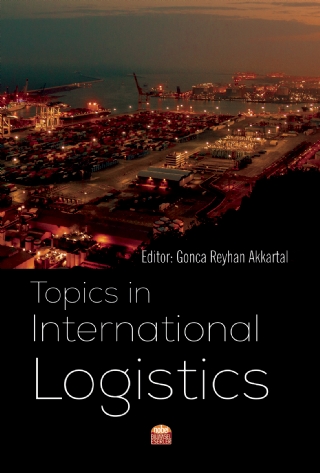
In the last decades, logistics and supply chain management have been the indispensable part of trade. By globalization, supply chains and logistic operations multiplied their importance. There have been many factors affecting logistics today. Not only the operational part but also the planning part has diversified areas. As a matter of fact technology helped the logistics industry too much. Although purchasing and many other transactions can be made via internet, goods must be delivery by the last mile. Finance, warehousing, procurement, management, organization, recycling and transportation of goods and services are parts of logistics and they have many sub-branches.
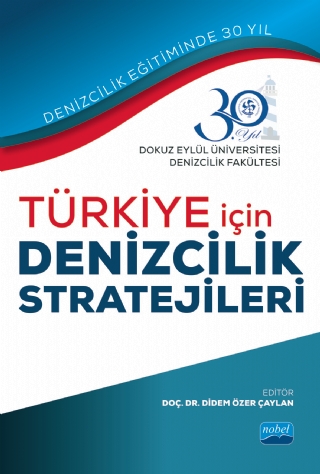
This work, which was created with the contributions of Maritime Management, Maritime Transportation Management Engineering, Ship Machinery Management Engineering and Logistics Management departments to commemorate Dokuz Eylul University Maritime Faculty's 30th year in maritime education, presents different perspectives on maritime strategies, the importance of which is increasing day by day in Turkey. consists of upcoming research and is presented in 20 chapters.
The developments that are the benefits of the technology age we live in and the hardening competitive environment have increased the necessity of comprehensive academic studies in the field of maritime, as in many other fields. In this context, the book it is foreseen that it will appeal to a wide readership in the fields of transportation, maritime and logistics. Researchers and academicians working on the aforementioned subjects, undergraduate, graduate and doctoral students, public and private sector officials, and anyone who wants to conduct research in the fields of transportation, maritime and logistics and who are interested in this field constitute the main readership of the book.
The developments that are the benefits of the technology age we live in and the hardening competitive environment have increased the necessity of comprehensive academic studies in the field of maritime, as in many other fields. In this context, the book it is foreseen that it will appeal to a wide readership in the fields of transportation, maritime and logistics. Researchers and academicians working on the aforementioned subjects, undergraduate, graduate and doctoral students, public and private sector officials, and anyone who wants to conduct research in the fields of transportation, maritime and logistics and who are interested in this field constitute the main readership of the book.
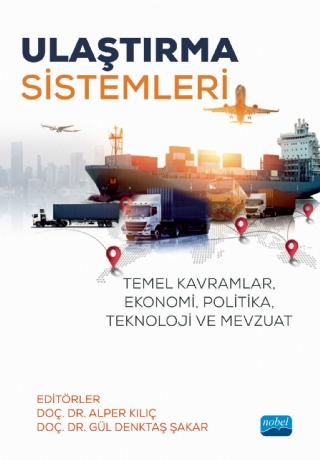
The concept of transportation has gone through various processes from the time of human existence to the present. In addition to being a component that constitutes a significant part of the cost within the framework of logistics management, both in passenger and freight transportation, it has also been a variable that significantly affects the effectiveness and efficiency of logistics processes. From this point of view, the concept of transportation and transportation systems continue to be an interesting subject for both practitioners and academics. Considering the foreign and local publications, it is seen that the publications within the scope of logistics and supply chain management are quite numerous, but the publications in the field of transportation systems and transportation management are very limited in number and content. The main reason for this is that countries offer local publications to the relevant audience within the framework of their own practices. It is thought that this publication, named Transportation Systems, will fill an important need especially in the literature written in Turkish. Since transportation systems should be evaluated from a multi-disciplinary perspective, the following main components required in the field of transportation systems are included in the book and presented to the attention of students, researchers, sector representatives and administrative units:
• Basic concepts of transportation,
• History of transportation,
• Transportation geography,
• actors and parties in transport,
• Transportation activities and components,
• Types of transportation,
• Integration of transportation modes,
• Loads that require special handling in transportation,
• Transportation economy,
• Transport statistics in Turkey and in the world,
• Transportation costs,
• Financial decisions in transportation businesses,
• Legal arrangements in the field of transportation,
• Safety and security in transportation,
• Sustainability and environment in transportation,
• Numerical methods in transportation systems,
• Recent developments in transportation and Turkey's transportation policies.
• Basic concepts of transportation,
• History of transportation,
• Transportation geography,
• actors and parties in transport,
• Transportation activities and components,
• Types of transportation,
• Integration of transportation modes,
• Loads that require special handling in transportation,
• Transportation economy,
• Transport statistics in Turkey and in the world,
• Transportation costs,
• Financial decisions in transportation businesses,
• Legal arrangements in the field of transportation,
• Safety and security in transportation,
• Sustainability and environment in transportation,
• Numerical methods in transportation systems,
• Recent developments in transportation and Turkey's transportation policies.

“The fundamental problem of humanity is to combine three variables: economic efficiency, social justice and individual freedom.” John Maynard Keynes (1883-1946)
If man realizes these three variables on a universal level, he will overcome other problems.
economics; It is a tool that helps to solve these problems both nationally and internationally. Increasing economic efficiency, ensuring human rights and freedoms and social justice are the basic components of the ideal society that is frequently mentioned in the post-Cold War world conjuncture, but relatively realized. Keynes said, “Markets are driven by animal instincts, not by logic.” As he says in his statement, actors in the field of economics go wild on stage.
For this reason, the fact that the rulers of countries, experts and academics have deep knowledge about economics turns crises into opportunities in issues that are closely related to social welfare such as unemployment, inflation, growth, productivity and foreign trade.
If man realizes these three variables on a universal level, he will overcome other problems.
economics; It is a tool that helps to solve these problems both nationally and internationally. Increasing economic efficiency, ensuring human rights and freedoms and social justice are the basic components of the ideal society that is frequently mentioned in the post-Cold War world conjuncture, but relatively realized. Keynes said, “Markets are driven by animal instincts, not by logic.” As he says in his statement, actors in the field of economics go wild on stage.
For this reason, the fact that the rulers of countries, experts and academics have deep knowledge about economics turns crises into opportunities in issues that are closely related to social welfare such as unemployment, inflation, growth, productivity and foreign trade.

People's transition from hunter and gatherer to settled order, urbanization and establishment of city-states, possession of seeds and products made division of labor and trade possible. This trade, which started with barter, led to the emergence of traders and businesses with the discovery of precious metals and money. The trade, which developed considerably through silk, took an international form. With the emergence of the railway and the telegraph, the businesses turned into increasingly gigantic enterprises.
The source of land, product, technology, knowledge and welfare has now become a commercial power. To have this power, military units were formed, alliances were made, laws were made and wars were made. Empires collapsed, regimes disappeared. Everything has come to an end, but the trade has not come to an end, he is still alive.
In this book, the theoretical and conceptual framework of international business is expressed and explained with case studies. International business is handled thematically with a multi-disciplinary approach.
The source of land, product, technology, knowledge and welfare has now become a commercial power. To have this power, military units were formed, alliances were made, laws were made and wars were made. Empires collapsed, regimes disappeared. Everything has come to an end, but the trade has not come to an end, he is still alive.
In this book, the theoretical and conceptual framework of international business is expressed and explained with case studies. International business is handled thematically with a multi-disciplinary approach.

In our globalizing world, in an environment of ruthless competition, logistics is an increasingly important sector. An efficient and effective logistics sector provides a cost advantage especially to exporting companies in a competitive environment, while making positive contributions to the growth of countries. Although it is very important that the logistics sector can work efficiently and offer economical prices, many countries cannot achieve successful results in this regard. At this point, although our country is located in a very important geographical region and has an important logistics infrastructure, it has not been able to improve its logistics service quality since 2007. According to the performance index ranking made by the World Bank every two years according to 6 different criteria, Turkey was in the 34th place in 2007, but today it has regressed to the 47th place. There are various reasons for this, but one of them is that the personnel working in the sector do not have sufficient knowledge.
The book contains all the information needed by the personnel working in the logistics sector and is a work that prepares university students for the sector. In particular, freight calculation, which is one of the most important issues in road transport, is given a special place and explained in great detail. In addition, delivery methods, payment methods and combined transportation issues were also explained in detail. It is aimed that the book will make significant contributions to all logistics personnel and students.
The book contains all the information needed by the personnel working in the logistics sector and is a work that prepares university students for the sector. In particular, freight calculation, which is one of the most important issues in road transport, is given a special place and explained in great detail. In addition, delivery methods, payment methods and combined transportation issues were also explained in detail. It is aimed that the book will make significant contributions to all logistics personnel and students.

In line with the globalization phenomenon, which has gained importance today, international marketing can be defined as "determining and meeting the needs of global consumers better than domestic and international competitors and coordinating marketing activities within the framework of the limitations of the global environment." Therefore, the important difference between national marketing and international marketing is not in the marketing tools used, but in the environment in which they operate. In international marketing, since customers are in foreign countries, the product or service marketed has to cross interstate borders. This means different legal regulations, different currencies and different levels of economic development, as well as different cultural environments and structures.
The main condition for the success of the business activities carried out by the enterprises in international markets lies in the necessity of adapting to international markets. Every company participating in international marketing activities has to determine its policy in a different way than domestically. The wants and needs of customers in foreign markets are often and often very different from those in the domestic market due to their belonging to a different environment.
Since international marketing has become a general activity of themselves, businesses have to increase their own effectiveness, especially at the scale of countries and with different marketing mix applications, in order to grow and expand. This is possible by determining, applying and developing new techniques in international marketing according to needs.
In this context, in the book within the details described so far, current and new issues that may have a significant impact on the international marketing discipline are discussed and explained with a broad and perspective view, and then the results are presented to the reader by interpreting them.
The main condition for the success of the business activities carried out by the enterprises in international markets lies in the necessity of adapting to international markets. Every company participating in international marketing activities has to determine its policy in a different way than domestically. The wants and needs of customers in foreign markets are often and often very different from those in the domestic market due to their belonging to a different environment.
Since international marketing has become a general activity of themselves, businesses have to increase their own effectiveness, especially at the scale of countries and with different marketing mix applications, in order to grow and expand. This is possible by determining, applying and developing new techniques in international marketing according to needs.
In this context, in the book within the details described so far, current and new issues that may have a significant impact on the international marketing discipline are discussed and explained with a broad and perspective view, and then the results are presented to the reader by interpreting them.

When we look at the world in general, not only conventional banks but also interest-free banks finance international (foreign) trade. Conventional banks can finance all kinds of legal goods or services with interest. Interest-free banks, on the other hand, can only mediate for goods that are halal to trade while financing international trade, and they can provide financing to international traders only with interest-free financing products. This book in your hand focuses on various interest-free financing products of interest-free banks and which interest-free financing products can support international traders. Thanks to this book, the reader will have the opportunity to learn about the development of international trade in our nearby geography, to get to know the interest-free institutions that support international trade, the types of contracts used in interest-free financing, and the current interest-free international trade finance products that have applications around the world.